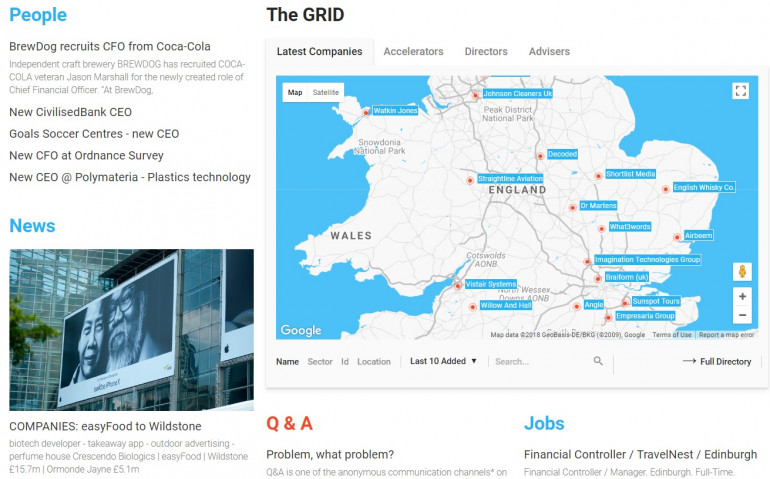Published by Directorzone Markets Ltd on August 1, 2016, 9:00 am in Knowledge, Market Info
Wednesday January 1st 2020

Digest of news and trends in the GRID marketplace in July 2016:
Rates, Apprentices & Payments | Platform Monopolists vs Digital Co-Operatives | Foreign-Owned Firms | Government Contracts For SMEs | Angel of The Year | Data Centres
RATES, APPRENTICES & PAYMENTS
The perfect formula - less red tape and more support | Kiki Loizou, The Sunday Times. July 24
“We want incentives for businesses to invest during a period of uncertainty,” said Adam Marshall, acting director-general of the British Chambers of Commerce. “There could be a much bigger reform of business rates and the government could do things like take new machinery out of the rates system so companies do not feel they are being penalised for improving production.” As it stands, companies’ rateable value increases if they invest in new equipment.
High on the agenda for many medium-sized ventures is the looming apprenticeship levy, which will require companies with a wage bill of more than £3m to pay a 0.5% payroll tax from next April. The aim is to fund 3m apprenticeships by 2020. There have been calls to delay the unpopular levy until later next year. “Businesses have asked for fewer upfront taxes and charges,” said Marshall.
Genevieve Sweeney launched her eponymous knitwear business last November …“My production costs are high and I don’t get paid until 45 days after delivery,”
Sunday Times reader comments: Rachel & John, July 24, 2016
“The comment about prompt payment is absolutely right, it should be a statutory obligation to
1. query and defective invoice within a few days of receipt and
2. to pay an invoice in cleared funds without any deductions or deferrals within 30 calendar days of the invoice date provided only that any queries raised within the few days of receipt were clarified or corrected within 15 days of the date for payment.
Practices such as deducting 5% for "prompt" payment, reducing invoice value to fund promotions such as BOGOF should be subject to a statutory fine of 1,000,000 times the deduction and the jailing of the offending company CEO and Company Secretary for 15 consecutive weekends from 5pm Friday until 0600 Monday!!”
PLATFORM MONOPOLISTS VS DIGITAL CO-OPERATIVES
Free-rider Google starves our creative talent of cash | Luke Johnson, The Sunday Times. July 24 2016.
… the rise of so-called platform businesses such as Amazon, Uber, Alibaba and eBay. These corporations don’t own production or linear supply chains; instead they harness and control networks of users and resources, enabling communities to interact and transact.
Winner Takes All economics. …Britain’s creative industries are being starved of investment thanks to parasitic free-riders such as Google and Facebook. These behemoths invest negligible sums in content, and mine advertising from media organisations that actually invest in music, writing, film and suchlike.
… the Competition and Markets Authority …spends too much time on minor mergers and not enough on big-picture issues that have more far-reaching economic effects.
The problems with 21st-century digital monopolies don’t just extend to profiteering and lack of choice. These companies frequently exploit consumers’ privacy, monetising their personal data. Moreover, regulators don’t take into account other impacts. The tech giants tend to pursue aggressive tax-avoidance policies and employ relatively few people, for example. At the same time they are ferociously active lobbyists, perpetuating myths such as the “sharing economy” in order to make their rapacious market-share grabs appear cuddly.
Supporters of the platform monopolists … claim new technologies and rivals will emerge to disrupt the current incumbents. Of course, upstart entrants are typically bought up by the monopolists to prevent any such threat: Facebook bought Instagram and WhatsApp; Google bought YouTube.
One solution is for digital co-operatives to emerge. Easily the best online success of this type is Wikipedia, a free exchange of knowledge without any toll on users or providers.
FOREIGN-OWNED FIRMS
The evidence is that foreign managers improve the British firms they acquire | The Economist. July 23.
In the past decade overseas investors have splurged £500 billion ($835 billion) to acquire nearly 2,000 British firms, almost three times the amount spent by British investors on acquisitions within Britain.
… the case against foreign investors does not stand up. A dear pound hardly helps exporters, but weak productivity is a bigger problem (in the manufacturing sector it is lower now than in 2011). And foreign owners seem to improve the situation. Economists reckon that about half the productivity gap between Britain and America is down to bad management. A paper by Nick Bloom of Stanford University and others shows that … when they take over British firms, American multinationals bring better technology and practices, lifting productivity by up to 10%.
… foreign-owned firms, which make up 1% of Britain’s businesses, appear to spend more on R&D; than comparable British firms. That boosts productivity and thus wages: a study by the OECD found that in Britain wages in foreign-owned companies were about 5% higher than they would have been were the firm under British ownership. Altogether, foreign-owned businesses account for half of British R&D; spending.
Overseas owners also shake up supply chains ... One paper found that a ten-percentage-point increase in foreign presence in a British industry raised the total factor productivity (which captures the efficiency with which capital and labour are used) of that industry’s domestic producers by about 0.5%.
GOVERNMENT CONTRACTS FOR SMEs
Yes, minister, it’s time to hand over the big deals | Kiki Loizou, The Sunday Times
Emma Jones, 44, founder of Enterprise Nation, a small business network that provides advice and training for entrepreneurs …Tomorrow the Cabinet Office will anoint her as the crown representative for small and medium-sized businesses. She will be tasked with pushing more government procurement contracts towards smaller firms.
Her ultimate goal is to increase substantially the amount of government spending that goes to small enterprises. The state spends a whopping £44bn on outsourced work, but only 27% is funnelled into small and medium-sized firms. The target is to increase that to 33% by 2020.
A new panel of about 20 business owners will be formed, meeting quarterly, to feed advice to government.
There are benefits in working for the state. Suppliers to government are paid in 30 days and often win work for several other departments. Companies that have the state on their client list can be better placed to secure deals with overseas governments.
One of her priorities is to push innovation within government by looking beyond available contracts and promoting smaller companies that can improve existing services.
Larger businesses, such as HP, are under pressure to have a wealth of smaller companies in their supply chain, Jones said. In many cases a start-up or small venture can supply the state via a well-known corporate. “All of a sudden the bigger firms are hunting the small ones,” she said.
ANGEL OF THE YEAR
Start-ups fear angels won’t invest after Brexit | Kiki Loizou, The Sunday Times. July 10 2016
The Brexit uncertainties have not deterred Simon Thorpe, who was named Angel of the Year at the association’s awards last week. Since 2008 he has invested in more than 25 companies and in the past 12 months he has enjoyed five paydays after firms he backed were bought. One of his big hits was London-based start-up SWIFTKEY, a maker of predictive keyboard apps that was acquired by Microsoft for $250m (£194m) in February. Many angels received returns of 10 to 13 times their initial investment.
Bad times can be good for savvy investors. Some of Thorpe’s best returns have come from companies born in the wake of the 2008 financial crisis, when valuations were low and backers could snap up equity in promising businesses at bargain prices. “It’s those businesses that have exited in the past 18 months.”
… important for the government to continue to support the seed enterprise investment scheme (SEIS) and enterprise investment scheme (EIS), which offer tax breaks to investors who put cash into fledgling companies. These initiatives have provided a lifeline for many entrepreneurs, and during tough times they are crucial for getting ventures off the ground; about 80% of angels use the tax breaks when striking deals.
Under the EIS, introduced in 1994, investors can reduce their income tax liabilities by 30%. This is the reward for accepting the risk of putting money — up to £1m a year — into young companies.
The SEIS was launched two years ago for micro-companies with assets of less than £200,000. They can raise a maximum of £150,000, and backers can claim up to 50% tax relief on investment capped at £100,000 a year.
DATA CENTRES
Increase in data collection drives growth in outsourced services | Jane Bird, FT. July 6
Remote data centres are expanding as more organisations outsource in-house computer systems to networked computer servers for the storing or distribution of large amounts of information. Data centre services range from the actual physical space needed to house an organisation’s private computers and software, to hosting data and applications and cloud computing. Big names already operating in the sector include Amazon Web Services, which belongs to the US-based online retailer.
Market watchers say one driver of future growth is likely to be the increasing amounts of data needed to operate driverless cars, which require large quantities of real-time data that will be gathered from and interpreted by sensors inside and outside the vehicle. Some estimates put the amount of information that will need to be gathered and analysed to operate a driverless car at 1 gigabyte a second, equal to about five hours of streamed television.
Growth will also be driven by the so-called internet of things.
The vast amounts of data being collected have already led to consolidation in the industry. For example, US-based Equinix acquired UK-based TELECITYGROUP for £2.6bn in January as part of a bid to increase its European operations.
Location is important for both clients and service providers because of the need to comply with different jurisdictions’ data protection regulations. Rules on what information can be stored and for how long can vary from place to place and also because of changes in legislation. For example, the EU scrapped its data-sharing agreement with the US last year following the revelations about data gathering by US security agencies in documents leaked by US intelligence contractor Edward Snowden.
A new agreement, the EU-US Privacy Shield, has been beset with wrangling and has yet to come into force. The UK vote to split from the EU is further likely to add to the confusion about where companies can store their data.
Amazon Web Services has announced plans to open a UK data centre, its third in the current EU member states, partly as an effort to address sovereignty concerns for European clients.
… executives seeking to hire external providers need to be aware of attendant risks.
Alex Rabbetts, chief executive of MigSolv, a UK-based data centre, says it can be hard for would-be customers to gauge how effective data service providers may be because certification standards (i.e. energy consumption) are often meaningless and confusing to non-specialists.
Another problem is poor customer service. A 2015 survey of more than 30,000 data centre users by MigSolv found the industry produced low levels of customer satisfaction. Stuart Barnett, chief technology officer of Wi-Q, an online restaurant ordering service, has tried several big providers and says that technical problems are often handled by email. This does not matter if you are just using a data centre for storage, Mr Barnett says. “But we’re running a service and our clients — bars and restaurants — need to know that their customers’ orders have been received. Being able to interrogate data fast is core to our business.”
Reliability is also important. The average cost of a data centre outage has risen from $506,000 in 2010 to $740,000 now, according to some estimates.
Costs can also be an issue. Some older data centres have been accused of imposing unreasonable fees for routine services and long contracts. However, increased competition is also leading to more flexible purchasing and pay-monthly options that can reduce fees. Steve Wallage, managing director of BroadGroup Consulting, says: “A number of smaller providers is starting to appear with a ‘we try harder’ approach and a customer relationship and support mentality.”








